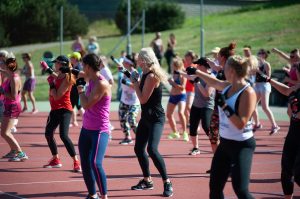It’s the birthday that many women dread. Turning 50. It’s a sobering thought for many of us. We may be reluctant to acknowledge our passage into our 50s. Women, however, intuitively know that 50 is a milestone birthday. Many of us realize that aging creates physical and mental changes which could, potentially, adversely affect our quality of life. While these are changes that MAY happen…there are things you can do to avoid or counteract the symptoms. The onset of menopause might be the first sign that we are approaching a milestone life event…that’s not one you can really avoid, it’s more about managing it. Another sign might be that first membership solicitation letter from AARP.
One irrefutable fact is that somewhere around 50, our bodies will experience physical and mental changes that we can’t help but notice. We may see weight gain, insomnia, new aches and pains, memory loss and feelings of regret or remorse over things done or not done.
What Causes Physical Changes after 50?
Menopause
This unavoidable “change-of-life” is responsible for many physical changes. The average onset of menopause is 51, but it varies between women, usually occurring between 45 and 55. It happens when we are in our prime.
- Weight gain may accompany menopause. We often develop more fat in our stomach and abdominal areas because of hormonal changes. The best defense is a good offense — reduce about 200 calories daily to avoid gaining those unwanted pounds. Give up that afternoon latte or a second glass of wine. Reduce salt intake to prevent fluid retention in our bellies, hands and lower legs.
>READ: DON’T LET THE DOWNSIDE OF MENOPAUSE “WEIGH” ON YOU
- Osteoporosis is the bone loss that may occur after menopause. As estrogen levels decrease, our bodies aren’t able to build new bone as quickly as we lose bone mass, resulting in the “silent disease” known as osteoporosis. If we are Caucasian or Asian women, we are more prone to bone loss. One out of every two women over 50 will suffer a broken bone because of osteoporosis. Walk at least 20 minutes daily in the sunshine — sunshine provides Vitamin D to help us absorb the calcium in our diet. Use resistance bands or lift small weights to promote bone strength. Stop smoking and limit alcohol consumption to help maintain bone strength. Talk to your doctor before beginning supplementation of calcium and Vitamin D — not all experts agree about calcium supplementation.
>READ: REVERSING OSTEOPOROSIS AFTER A DIAGNOSIS
- Sexual changes Aging shouldn’t rob us of our sexual life. Some couples experience renewed sexual energy once the fear of pregnancy or the kids walking in is gone. But many women find that sex is now painful because of vaginal dryness. The drop in estrogen levels may lower our desire to have sex. Decreased body image may cause us to become reluctant sexual partners. Talk to your gynecologist if vaginal dryness or loss of desire becomes a problem.
>READ: FEMALE DRYNESS: A TOPIC WE RARELY DISCUSS

Cardiovascular disease
It’s the leading cause of death of women. Cardiovascular disease is a broad range of diseases that affect our heart and blood vessels, including heart attacks, coronary artery disease, vascular disease, strokes, congestive heart failure and less common heart and blood vessel problems. A relatively common problem in women over 50 includes feeling like our heart is racing away or is skipping a beat. These symptoms might indicate atrial fibrillation — this particular condition may also increase our risk for a stroke. More women die of strokes than breast cancer. Be sure to talk to your doctor if you experience pain, fluttering or pressure around your heart or if you feel dizzy or weak while exercising.
>READ: HEART HEALTH AFTER 50 – TOP 10 HABITS TO ADOPT FOR THE SILENT KILLER
Urinary Issues
More nighttime trips to the bathroom? Accidents? Unfortunately, urinary dysfunction begins to appear in our 50s. Sometimes, they are attributable to our declining estrogen levels. Other times, our pelvic muscles may weaken from vaginal births — in this case, Kegel exercises and/or prescriptions meds are just what the doctor ordered. Studies show that the majority of women don’t talk about urinary frequency or leaks with their doctors; we just suffer in silence. If these conditions worsen, we may be tempted just to stay home. Get help so that you can continue the active lifestyle you want to maintain.
>READ: URINARY INCONTINENCE: CAUSES & TREATMENTS

Wrinkles, age spots and moles
Don’t overlook your skin. The years take a toll on our skin. Use sunscreen to help prevent further damage. While wrinkles are cosmetic and can be mitigated with Botox, fillers and prescription retinol products, or over-the-counter creams, many women over 50 choose to embrace their wrinkles as proof of a life well-lived. Don’t overlook suspicious-looking age spots and moles. Some could be one of several types of skin cancer — “sun worshippers” need an annual full-body screening for skin cancer.
>READ: LIVE LONGER BY DETECTING SKIN CANCER EARLIER
How can we keep our brains healthy?
The good news is that we keep producing new brain cells well into our 60s. Our capacity to learn new skills and learn new things remains strong. But, we lose 2 to 5 percent of our brain volume every decade after 40. Let’s be proactive to avoid dementia and Alzheimer’s later in life.
Memory problems?
It’s true that as we age, it takes us a little longer to access the information stored in our brains. But a recent study shows that the hippocampus (the part of our brain responsible for learning and memory) increases in size when we do aerobic exercises regularly. That 150-minutes of exercise that we do is a multitasker — it promotes brain health as well as promoting physical health.
Don’t worry about absent-mindedness like wondering what we went into the kitchen to get. This kind of memory loss is common as we age, but not significant unless we begin forgetting to pay bills or forget our destination when driving.
Our brains are quite amazing — when we reach 60, we have stored four times more information than someone has at 20. All of this stored information is one of the reasons that it sometimes takes longer to “find” that word. Think of our brain as being the hard drive in a computer. As the hard drive is filled with information, our computer slows down a bit.
>READ: NEVER FORGET: 5 WAYS TO IMPROVE COGNITIVE FUNCTION AND MEMORY
High blood pressure
This isn’t just a physical problem. High blood pressure already affects about half of women in their 50s. After 60, more women have high blood pressure than men.
High blood pressure may cause a decline in cognitive performance, scramble brain-cell connections and damage blood vessels in our brain — raising our risk for Alzheimer’s significantly. High blood pressure quadruples our risk for a stroke, an event that could disable us for the remainder of our life. Make sure you stay on top of getting it tested!
>READ: 12 MEDICAL TESTS FOR WOMEN OVER 50

The truth about Alzheimer’s disease in women
Once we reach our 60s, we are twice as likely to develop Alzheimer’s disease in our life as we are to develop breast cancer. Two-thirds of the people living with Alzheimer’s disease are women. Studies are underway to discover why women are more likely to develop Alzheimer’s — it may be that women live longer than men or it may be related to our childbearing history or related to how women metabolize sugar.
If we don’t have Alzheimer’s, we are more likely to be a caregiver for someone with Alzheimer’s – either our spouse or our aging parent.
Risk factors for Alzheimer’s include:
- Depression
- Diabetes
- Hypertension (High Blood Pressure)
- Insomnia
- Obesity
- Sedentary lifestyle
- Smoking
All of these risk factors are modifiable. We have change behaviors or seek medical help to modify our risk of Alzheimer’s.
>READ: THE LINK BETWEEN ALZHEIMER’S, ESTROGEN, AND MENOPAUSE
Insomnia
A complex problem with complex causes. Our inability to go to sleep and stay asleep might be a combination of seemingly small daily activities. Let’s look at these activities.
- Go to bed at the same time and get up at the same time, every day of the week.
- Don’t go to bed if you’re not sleepy.
- Our bedroom environment is important – make sure it’s dark, quiet and cool.
- Leave the TV out of the bedroom.
- Don’t nap after 3 pm.
- Avoid caffeine (coffee, tea, chocolate and cola) for 4 to 6 hours before bedtime.
- Limit alcohol just before bedtime — it disturbs REM sleep. If you consistently wake up at 2 am and can’t go back to sleep, cut back on alcohol consumption.
- Don’t use devices with LED lights and blue lighting within an hour of bedtime.
- Establish a bedtime ritual like a warm bath or stretching or guided meditation.
- Consider calming music as a sleep aid. Spotify and Calm radio provide music specifically for sleeping.
>READ: FOODS THAT PROMOTE SLEEP AND THOSE THAT DON’T
The take-away of all that we’ve learned, according to Elizabeth Selvin, a Johns Hopkins Bloomberg School of Public Health professor of epidemiology, is, “The lesson is that to have a healthy brain when you’re 70, you need to eat right and exercise when you’re 50.”
Turning 50 is the ideal time to reverse the onset of our first signs of aging before they become more difficult to modify.
>READ: NIGHT MOVES: MENOPAUSE, SLEEP, AND RESTLESS LEG SYNDROME
>READ: PERIMENOPAUSE: THE RAGE IS REAL
>READ: STRATEGIES TO DELAY OR PREVENT DEMENTIA









